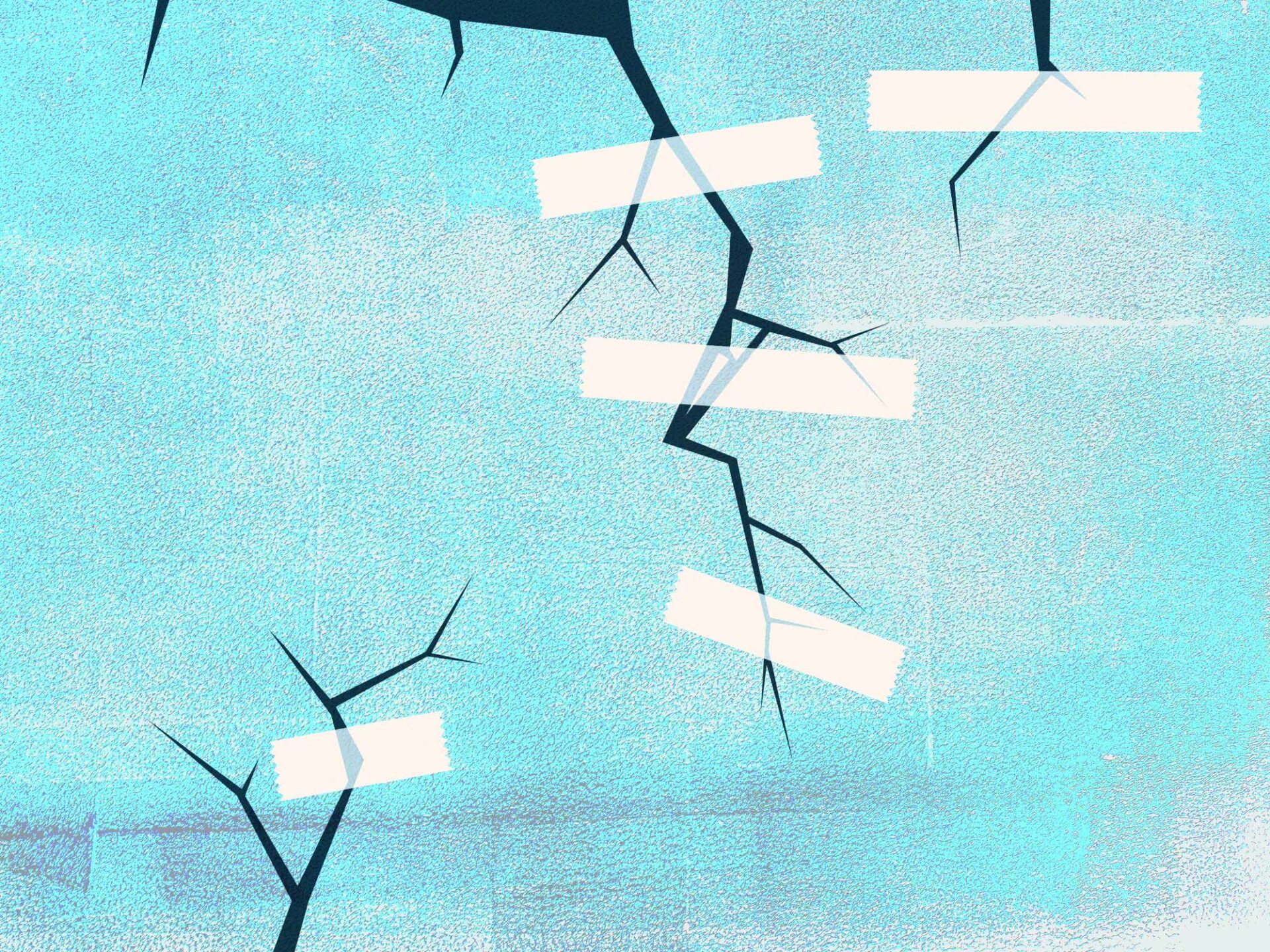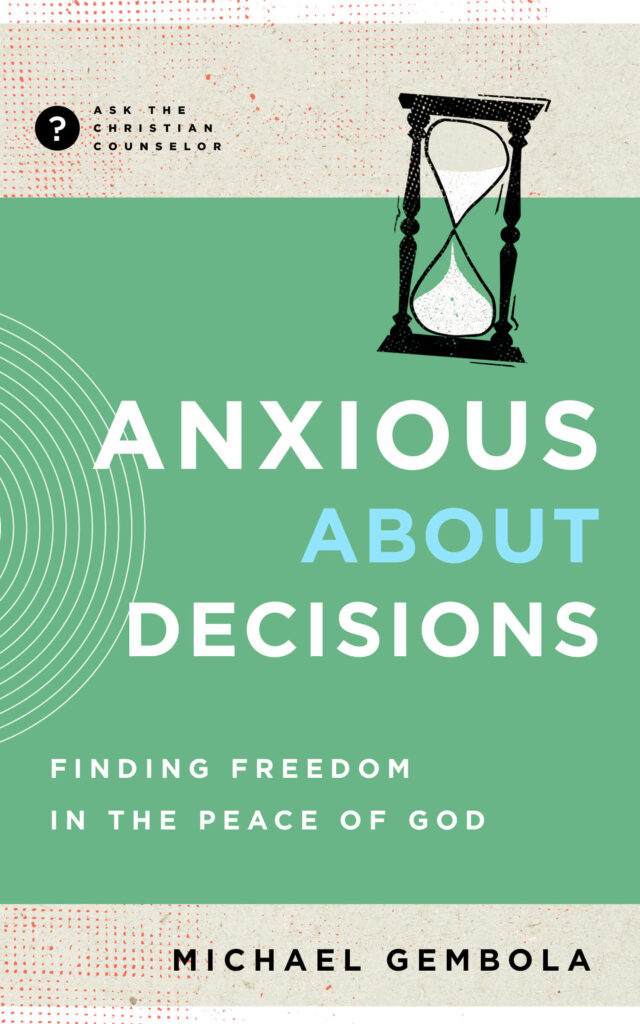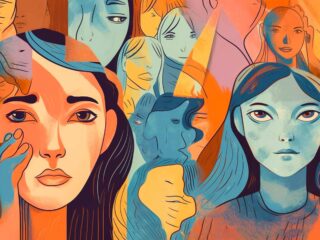The first step in getting past decision anxiety is to stop using the old ways we’ve tried to find rest. Sometimes the things we lean on cannot hold us. In 2 Kings 18:21 we read these surprisingly wise words spoken by an enemy of God’s people: “Look, I know you are depending on Egypt, that splintered reed of a staff, which pierces the hand of anyone who leans on it! Such is Pharaoh king of Egypt to all who depend on him.” We can likewise seek the wrong kind of assurance, safety, and support by leaning on a walking stick that can’t hold us up, one that pierces our hand. Strategies for reducing anxiety don’t help in the way we hope they would and, in the end, actually accelerate anxiety.
It’s here that decision anxiety can fit several of the criteria of OCD. The OCD response to anxiety works like this: people with an extreme fear of germs can wash their hands over and over and construct increasingly elaborate showering or vacuuming and disinfecting rituals. Similarly, people who struggle with decision anxiety can have a whole set of counterproductive practices they use to seek assurance.
OVERTHINKING
Decision anxiety and ruminating are almost synonymous. One of the most common problems in decision-making is the inability to narrow down options. Or some of us narrow our options, but then we find that we keep adding them back to the list. The etymology of the word decision is to “cut off,” and how fitting the word’s history is—when making a decision, it is both necessary and painful to cut off options. Decision anxiety locks in on the risk of letting go of a good option, insisting that we revisit options that we had previously removed from the list. Or if we do make a decision, we struggle to stick with it. Our decisions live under perpetual review. As one researcher says, “over-thinking is often the enemy of a satisfactory conclusion.”
OVERCONSULTING
Decision anxiety leads us toward leaning too heavily on the opinions of others. Of course, sometimes you do get advice that is just pure gold. You hit on something extremely valuable in a friend’s knowing, insightful comment. But usually, our wise friends function more like road signs, lines, and guardrails: useful, vital, and protective, but they can’t ultimately tell you which direction you need to go.
The reason we can become overreliant on others is because we don’t trust ourselves to make a good decision. We feel the weight of having the role of decision-maker, and something deep inside wishes that just maybe someone else might be willing to step in and make the call. On the one hand, it sounds really spiritual not to trust ourselves. On the other hand, many of our decisions are truly ours and not someone else’s. And if God alone deserves our ultimate trust, then we can’t rest fully either on ourselves or on other people. We’re left with the responsibility of prayerful discernment, with God and others, and then the obligation to make our decisions.
The scary, practical reality is that it feels like God puts enormous decisions into our hands. And that can be heavy to bear. So we absolutely want to bear this burden with others and turn away from overdependence without overcorrecting to extreme independence and individualistic living. We want to break the cycle of obsessive consulting, which looks like this: you reach out to others, and then when the sense of risk doesn’t go away, you keep on reaching out, too many times to too many people. I have known people paralyzed because their advisers have different opinions, and the person feels stuck in the middle. The tragedy here is that we can exhaust all of our friends, family, and mentors and still in the end feel more alone and confused than ever.
OVERCHECKING
Related to overthinking, one mark of decision anxiety is to overcheck or overmonitor whatever risk indicators we have. Usually this includes the wrong kind of interest in emotion. On the one hand, many Christians need to pay better attention to emotions. Lots of things go wrong when we never stop to think about how we feel. We’re not, as James K. A. Smith likes to say, “brains on a stick.” But on the other hand, when we have decision anxiety, monitoring our emotions too closely can create more problems. This gets even more complicated by the belief that God primarily leads us to wise decisions through impressions and felt assurances. Emotions are often helpful indicators, but they are our reaction to the world, guided by how we interpret our world and what we value. So emotions can tell us something but not everything, and often not enough in themselves to be a clear or decisive guide.
The key problem with overchecking is that it takes us away from life in the here and now, and we get lost in our heads. This can look like constantly monitoring how you feel about your internship or college major or thinking too much in real-time about whether you’re really enjoying the date that you’re on. It’s possible to so frequently check for assurance that we aren’t able to engage what’s right in front of us.
Anxiety makes it hard to focus on the here and now, leading us away from where God has called us today. These fears can also drive the desire to escape the hard work of making decisions.
OVERESCAPING
Decision anxiety is essentially an effort at avoiding risks that can’t be totally avoided. Sometimes that avoidance looks like a football player running at full speed, spinning, stiff-arming, and evading tackles. Sometimes that avoidance looks like not stepping onto the field at all. Of course, the stereotypical avoidance strategies include phone-scrolling, shopping, and video games. But really it can involve anything other than the work of the hard decision. It’s similar to what the medieval Christians called acedia. It’s usually translated sloth, but it doesn’t necessarily mean laziness. Usually it involves doing some- thing, just not the spiritual task at hand. This is why, as many have pointed out, being a workaholic or couch potato can both stem from the same issue—avoidance. The best description I’ve heard is that acedia is “resistance to the demands of love.” A key move away from anxiety is to pursue the opposite: Who is God calling me to love? What does this call require of me today?
Decision anxiety usually feels like an experience of suffering, but to bring in the language of love may make it sound moral. Is decision anxiety a sin, too, if it resists the demands of love of God and our neighbor? If your friend at dinner is stuck between menu choices and holding up the order, you’re probably not feeling wronged in any meaningful sense. Irritated, maybe, though in view of what you’ve read so far in this book, you might feel compassion. But that compassion for the anxious usually runs out when you see a friend dating someone who avoids a decision on commitment. The person they’re dating is nice enough, but weeks turn into months and years of a relationship that never reaches a conclusion. It’s much harder to be compassionate toward a person’s decision anxiety when it’s so deeply hurting one of your dear friends. Or perhaps you’re the person who maintains multiple options for too long. What tends to drive this? I know one pastor who calls it “the idolatry of options.” And he probably has a point. Ancient cultures built idols and maintained practices to appease the gods and keep them safe from wars or crop failures. We’re not ultimately all that different. A biblical understanding of sin is not just willful pleasure-seeking at the expense of others. Often we do damage by turning to the wrong things when we are afraid. We hold onto unloving practices that help us feel safe. But any false refuge ultimately doesn’t keep ourselves or other people safe.
Maintaining options and delaying decisions gives a false sense of safety. In contrast, good decision-makers seem to set time limits for themselves, or at least they don’t let the decision-making process go on indefinitely. If you wait long enough, options will start dropping off, and that can make the decision easier. But really this is a form of self-sabotage. The clock won’t necessarily make better decisions than we will, and we don’t escape the possibility that we’ll still have lots of regrets and what ifs to look back on because of the lost options.
You may have experienced other marks of decision anxiety. Most are forms of avoidance or escape. I know of some people who always try to choose the safest option because it feels wise. But the downside of this default process is that it makes life quite small—and it requires no faith. I know of others who feel like they should choose the least pleasant option because it seems like it might be the godliest option. At least then they would know they weren’t being selfish and just trying to avoid suffering. All these methods or formulas create the illusion of escaping the act of making a decision. But all of these efforts to avoid risk ultimately fail. And they don’t necessarily lead to better decisions. So how will God meet us in this?
Pray with me that God will unravel what keeps us tied down and anxious and interrupt the practices that maintain our intolerance of uncertainty. Pray he will guide us toward places of rest and refuge in the presence of risk. In the next section, we’ll look at several of the common arenas for decision anxiety and how to not only avoid making it worse but how to make concrete changes for the better.
Excerpted from Anxious about Decisions: Finding Freedom in the Peace of God © 2022 by Michael Gembola. Used with permission of New Growth Press. May not be reproduced without prior written permission.
Anxious About Decisions: Finding Freedom in the Peace of God
Do you get anxious when you have to make a decision? Do you overthink, overtalk, and overanalyze? When anxiety surrounds every decision, the result can be decision-making paralysis. Counselor Michael Gembola explores this common struggle and then points to the peace that comes from knowing God as your refuge and ever present help in trouble.






